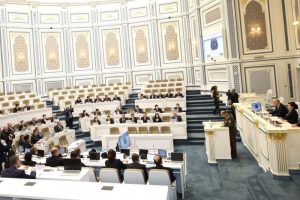SCO countries approve draft Energy Cooperation Strategy until 2030 in Astana
Read also
DUSHANBE, 22.06.2024 /NIAT «Khovar»/. On June 21, Minister of Energy and Water Resources of the Republic of Tajikistan Daler Juma took part in the fourth meeting of the Ministers of Energy of the Shanghai Cooperation Organization (SCO) member states was held in Astana on June 20-21, 2024, under the chairmanship of Kazakhstan.
During the meeting the heads of energy agencies of the SCO countries considered and approved the «Strategy for the Development of Energy Cooperation of the SCO member states until 2030».
The document outlines the key areas of cooperation among SCO member states in the energy sector until 2030. These areas include the potential development of energy resource transit capabilities, diversification of export routes, and the establishment of a new energy system that balances industry development priorities. It also focuses on modernizing traditional energy sources, systematically improving the industry, developing innovative technologies and renewable energy sources (RES), advancing hydrogen energy, and exploring new solutions for energy saving and increasing energy efficiency.
«In the approved Strategy, we have reached a consensus on the need for a balanced approach, integrating both traditional and renewable energy in accordance with the national conditions of the SCO countries,» noted Minister Almassadam Satkaliyev.
The heads of energy agencies also discussed strategic approaches to energy cooperation, promoting new methodologies and developing specific solutions aimed at ensuring the sustainability and growth of the energy sectors in member states, observer states, and SCO dialogue partner countries.
The ministers exchanged views on the current state and prospects of the global and regional energy agenda. They discussed the development of the energy sector, particularly the potential for attracting investment and financing for projects and programs in this area.
The Shanghai Cooperation Organization (SCO) is a regional organization that provides a platform for dialogue and cooperation among its member countries. Currently, the SCO accounts for about a third of the world’s GDP, covers 60% of Eurasia, and encompasses 42% of the global population. The energy sector is a critical component of SCO cooperation, contributing significantly to the development of various interaction spheres, particularly the economic sphere. The SCO unites some of the largest producers, transit countries, and consumers of energy resources.











 Norak Hydropower Plant Rehabilitation Phase One to Be Completed in December 2026
Norak Hydropower Plant Rehabilitation Phase One to Be Completed in December 2026 Tajikistan Begins Preparations for Transition to 12-Year Education System
Tajikistan Begins Preparations for Transition to 12-Year Education System Industrial Output in Tajikistan Reaches 66.7 Billion Somoni in 2025
Industrial Output in Tajikistan Reaches 66.7 Billion Somoni in 2025 Tajikistan Approves Protocol to Agreement on Forces and Means of CSTO Collective Security System
Tajikistan Approves Protocol to Agreement on Forces and Means of CSTO Collective Security System Davlatshoh Gulmahmadzoda Attends Meeting of Russian Foreign Minister with CIS Ambassadors
Davlatshoh Gulmahmadzoda Attends Meeting of Russian Foreign Minister with CIS Ambassadors














